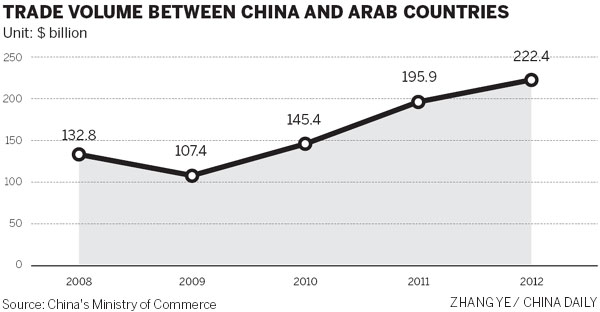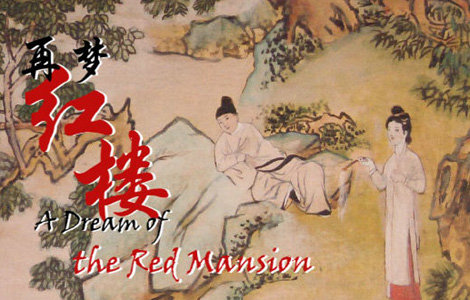China-Arab world trade grows
Updated: 2013-07-18 05:44
By Zhong Nan (China Daily)
|
||||||||

Chinese companies will have to add more high-tech elements to their products, if they want to cash in on the growing trade between China and the Arab world, said Li Jinzao, China's vice-minister of commerce.
"Amid economic globalization and regional integration, the economic and trade ties between China and the Arab world are increasingly close, with the rapid rise of bilateral trade," said Li at a news conference on Wednesday.
In 2012, bilateral trade between China and Arab nations hit $222.4 billion, up 14 percent and a record high. Chinese exports to Arab countries stood at $91.3 billion and imports from the region reached $131.1 billion.
The Arab world comprises the 22 countries and territories of the Arab League, with a combined population of about 422 million people.
Some Arab nations have oil wealth, such as the member states of the Gulf Cooperation Council, including Bahrain, Qatar, Saudi Arabia and the United Arab Emirates.
"The two sides are important trading partners with each other. Both are keen to adjust their industrial structure for exports to seize more business opportunities," Li said.
"Energy cooperation, high-end machinery and daily necessities will play a key role in dominating the trade between China and the Arab markets over the next three years."
China mainly ships construction machinery, manufacturing equipment, steel, electronic products, textiles and garments, household appliances and daily necessities to Arab countries. Chinese-made passenger vehicles have also become popular family cars in the region.
In addition to crude oil, petrochemicals, fertilizer and other products, Arab countries' exports to China have become more diversified, including marble, olive oil and sesame products.
"With the world experiencing an economic downturn, China is taking concrete steps toward a low-carbon, high-tech economy by curbing overcapacity and energy-intensive industries on the one hand and encouraging industries with a high technology content to boost their exports, on the other," Li said.
Approved by China's State Council, the China-Arab States Economic and Trade Forum has been upgraded and renamed the China-Arab State Expo.
This year's expo will be held in mid-September in Yinchuan, the capital of the Ningxia Hui autonomous region.
Ningxia is China's only provincial-level autonomous region for the Hui ethnic group, who have strong religious and business connections with the Arab world.
"China and the Arab states will further strengthen cooperation in infrastructure construction and tap the potential of new areas such as aviation, urban development, agriculture, logistics, finance, tourism and cultural innovation to diversify exchanges between the two sides," said Liu Hui, chairwoman of Ningxia.
The central government ratified the construction of its first inland foreign-oriented economic trial zone in Ningxia Hui and the Yinchuan Bonded Area in September 2009.
These facilities offer more international trade, commercial and urban development opportunities for the region.
"As the first zone of this kind, we want to further develop key sectors such as logistics, finance and information services through regional cooperation, which includes working with a number of domestic commercial banks, bonds issuers and trust funds to enhance our financing capability," said Yuan Jiajun, executive vice-chairman of Ningxia.
Yuan said Ningxia is trying to form joint financial service agencies with wealthy Arab nations to attract petrodollars, which represent the US dollar-denominated incomes of oil-rich countries, especially the Gulf States, through the sale of oil to other economies, to provide financial assistance to Ningxia.
"Ningxia's energy, halal food and Muslim commodities industries are quite suitable for the use of petrodollars. We expect the central government could relax the restrictions on foreign capital in these sectors," Yuan said.
"The success of the Shanghai Free Trade Zone pilot program will also be applied in the zone's development sooner or later."
Yu Ping, vice-president of the China Council for the Promotion of International Trade, said the benefit would be mutual. Petrodollars could provide sufficient financial support to further stimulate bilateral trade and investment relations.
In 2012, Gulf financial institutions purchased large stakes in Chinese companies listed in Hong Kong.
Qatar, Kuwait and other countries' sovereign wealth funds shared about $1 billion in investment quotas under the qualified foreign institutional investor program, according to the China Chamber of International Commerce in Beijing.
In 2012, Chinese enterprises invested $1.4 billion in Arab countries such as Qatar, Jordan, Kuwait and Egypt, up 120 percent year-on-year.
The investment areas cover garment machinery manufacturing, construction machinery, resource development, automobile assembly facilities and light industries.
zhongnan@chinadaily.com.cn
(China Daily USA 07/17/2013 page13)
Most Viewed
Editor's Picks

|

|

|

|

|

|
Today's Top News
US unlikely to be swayed by pork firm's possible IPO
Alibaba earnings tripled in first quarter
Top film regulator relaxes control on scripts
Markets inch up after Fed's testimony
GSK finance head not allowed to leave
Putin puts US ties above Snowden
DPRK demands Panama free seized ship
7.75% growth possible for 2013
US Weekly

|

|













